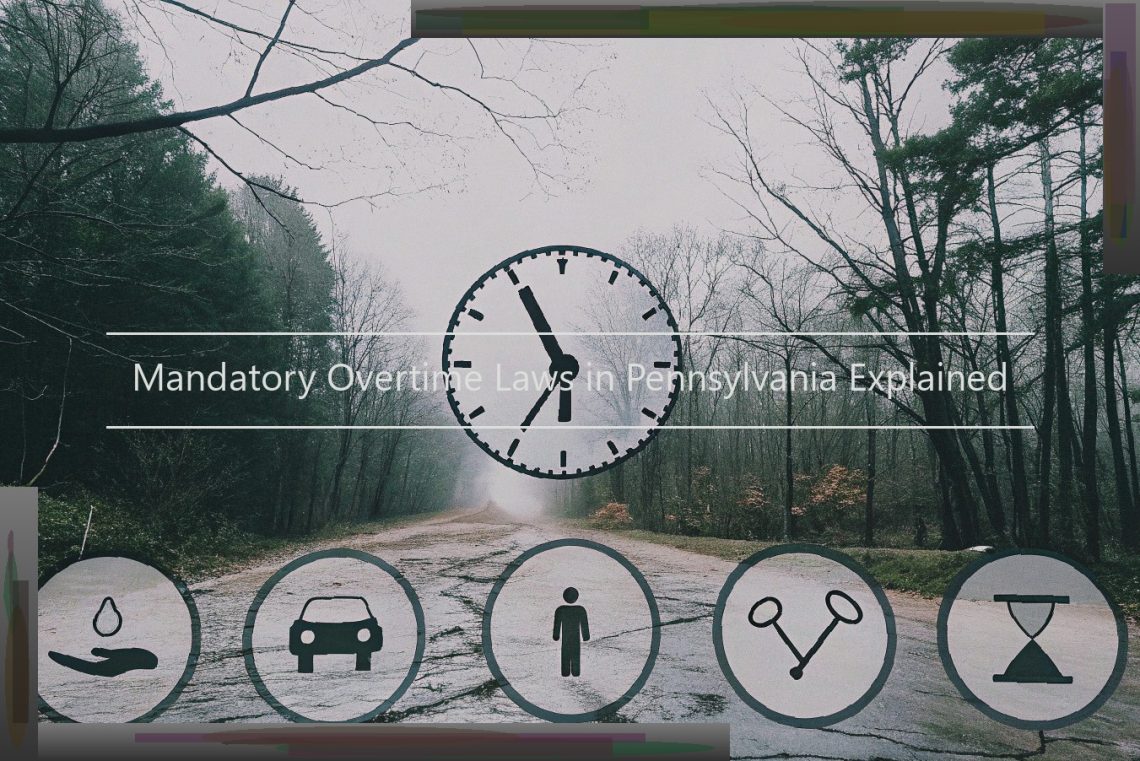
Mandatory Overtime Laws in Pennsylvania Explained
A Guide to Overtime Laws in Pennsylvania
Mandatory overtime laws are governed by a complex matrix of federal and state law. These laws require employers to pay employees a premium, usually time-and-a-half, when the employees work for more than 40 hours in the workweek. These laws also require that certain employees be paid a minimum wage. If employers fail to pay employees the correct amount, the employer may be liable for liquidated damages.
The federal law regarding federal wage and hour issues is set forth at the Fair Labor Standards Act ("FLSA"). The FLSA establishes minimum wage requirements and overtime requirements. There are several broad exemptions to the FLSA, which usually apply to professionals, executives, computer programmers, and highly compensated employees. Under the FLSA, the Department of Labor promulgates regulations defining what a work week is. This definition includes what days are considered part of the workweek and what hours of those days are included in determining whether overtime has been worked. The FLSA applies to all employees who work for private sector employers engaged in interstate commerce. The definition of engaged in interstate commerce has been broadly defined and applies to nearly all employers regardless of their business. At the state level , Pennsylvania has a labor law which is similar to the FLSA. In Pennsylvania, overtime laws are set forth in Article VIII of the Pennsylvania Labor Code, found at 43 P.S. Section 333.101 et seq. The Pennsylvania Department of Labor and Industry has promulgated regulations at 34 Pa. Code Sections 231-241, setting forth what is required under Pennsylvania State law.
Determining how many hours a given employee works during a designated workweek is determined on a large scale by employers. The Department of Labor Regulations at 29 CFR 778.104 specify the scope of the definition of workweek. The scope of the Pennsylvania labor regulations at 34 Pa. Code 231.1(a)-(b) mirrors the regulations found under the FLSA. The FLSA regulations define a workday as a "regularly recurring period of 24 hours." 29 CFR 788.105. The workday, under federal law, begins at the first principal activity of the employee and encompasses the entire 24-hour period of time the employee is employed. The Pennsylvania Department of Labor Regulations specify that a workday begins at the time work commences and ends at quitting time. 34 Pa. Code 231.1(b). The regulations do provide that work performed away from the employer’s premises or establishment is not considered work performed in the course of employment.
Is Mandatory Overtime Allowed in PA?
Mandatory overtime is legal in some situations in Pennsylvania, just as it is in any state. The Federal Labor Standards Act ("FLSA") does not mandate or prohibit overtime hours, and Pennsylvania provides little guidance on the applicability of overtime law to mandatory overtime. Generally speaking, the FLSA permits (and the Pennsylvania statute mirrors) the application of overtime at 1 ½ times the regular hourly rate (including certain bonuses and commissions) for hours worked over 40 hours in a single workweek. The Pennsylvania overtime wage law does not apply to employers who are not covered under the FLSA. A few Pennsylvania statutes address overtime and mandatory overtime specifically, but none of them prohibit mandatory overtime.
In Pennsylvania, as in most states, employers are permitted to prescribe hours of work, including required overtime hours, for their employees. As long as the pay policies are not discriminatory, there is no statute that states a private sector employer may not impose mandatory overtime on its employees. Employers may not, however, impose mandatory overtime on their employees in the public sector. Public sector employees are not exempt from compliance with an FLSA overtime policy, for example, even though they are exempt from mandatory overtime. State law would not exempt them, either, where there is no such exemption in the law.
In Pennsylvania, the Prohibition and Regulation of Excessive Overtime in Health Care Act ("Act") requires that entities such as nursing homes and hospitals limit mandatory overtime as a condition of employment, unless the employee has previously agreed to work overtime as a condition of employment. There are no available court decisions interpreting the Act, but it appears it offers the most limited scope of allowable mandatory overtime hours in the state.
Exceptions to Mandatory Overtime
Exceptions to Pennsylvania’s Mandatory Overtime Rules
Washington County has passed legislation which prohibits businesses from requiring their employees to work more than 60 hours a week or 12 hours a day. The law contains several exceptions including, among other categories, "health care workers" which is defined as an "employee or volunteer working for a licensed health care facility, home health care agency, hospice or kidney dialysis center." "Licensed health care facility," in turn, is defined as a "hospital, nursing home, intermediate care facility, personal care home, assisted living residence, adult day care center or home health care provider duly licensed under the laws of the Commonwealth of Pennsylvania."
For there to be a violation, the employee must be required to work more than 60 hours in a week or 12 hours in a day as a condition of continued employment. It is unclear, however, whether someone who is the victim of unspecified overtime violations, is sufficiently a "victim" for purposes of the new law.
Exception to Washington County’s Overtime Law
Washington County’s mandatory overtime law follows the Pennsylvania statute that provides exemptions for certain public agencies and private organizations. Thus, certain private nonprofit agencies exempted under state law are not covered by the law. School districts and public agencies of state or national security are also excepted.
Further, Pennsylvania law provides an exemption from the mandatory overtime prohibition to employers whose primary purpose is the provision or operation of residential…. institutional facilities for persons with developmental disabilities or mental retardation. Further, the state has expanded this exemption to include employers whose primary purpose is the provision or operation of facilities for persons diagnosed with a psychiatric disorder. This exception does not apply, however, to the extent the facility is operated for profit.
While Washington County has passed its own law prohibiting overtime over 60 hours and 12 hours, the law does not change any other federal or Pennsylvania state employment laws. For businesses in Washington County, the mandatory overtime law may provide a safe haven, but the other laws related to excessive mandatory overtime will also apply.
What Rights and Protections Do Employees Have?
While onerous scheduling demands are not prohibited, employees have rights and protections under the Pennsylvania Wage Payment and Collection Bill of Rights, including:
Handbook Provision
Employers may include in their handbooks a provision indicating that an employee must work on weekends or holidays, subject to the business needs of the employer.
Employment Agreement
Employers can enter into an employment agreement with an employee that contains provision(s) indicating that an employee may be required to work on weekends or holidays. The agreement must also be signed by the employee.
Record Retention
If an employer asserts that an employee agreed to work such overtime as requested by the Employer, the employer must maintain a record of any such agreement, either written or electronic, for the duration of the Employee’s employment period and for an additional three year period.
How Mandatory Overtime Affects Employers and Employees
The impact of mandatory overtime on employers and employees is a double-edged sword. For employers, mandatory overtime can be a method for increasing productivity in a short time span and for covering shifts for absent employees. It also allows for an employer to avoid incurring additional costs in hiring, training, and overtime pay for its own employees. However, the use of any mandatory overtime drasically increases the overall workweek of each employee subject to the mandatory overtime. Unlike most exemptions to the regular forty (40) hour workweek for non-supervisory, blue collar workers, there is no additional benefit to the employees. While most individuals would perceive a day or two more of pay as a bonus, to many it means additional time away from other important aspects of their lives such as family , church, school, etc. In addition, these extended hours in a physically demanding environment much be viewed against the fact that most of these positions require a minimum amount of rest between shifts, often 10, 12, or 24 hours. When forced to work additional time at the end of their shifts this rest is not occurring and is beginning to affect the health and well-being of these employee. While the federal guidelines will allow for some exception to the general requirement of 7 days of rest, the amount of time permitted to work under the guidelines should be a last resort. There are several areas both in the Health & Welfare Code and the Federal Motor Carrier Safety regulations that provide for 5 day work-weeks with 7 days of rest and which must be reviewed before requiring any mandatory overtime.
Recent Developments and Court Decisions
In Pennsylvania, since 2008, there have been regulations that generally prohibited health care employers from requiring employees to work mandatory overtime. The regulations were so restrictive that many hospitals and health systems were willing to disregard them. The concept was that if a hospital needed to require a nurse to work additional hours, the provision & conditions of the Pennsylvania Department of Health (the "Department") regulations would make it impossible for the health care employer to require the nurse to work the additional hours. Therefore, hospitals and health systems simply disregarded the Department regulations. The potential risks of the regulations simply were too great or complicated for a hospital to deal with. Now, the Department has repealed the regulations, and the Pennsylvania legislature is considering legislation that would regulate mandatory overtime issues in Pennsylvania.
The Department’s regulations implementing the law limited the requirement to mandatory overtime where "the health care employer has exhausted its reasonable efforts to obtain staffing from its own staff." That was the issue. On any day, most nurses are not going to volunteer to work overtime. If they follow the regulations and exhaust their own staffing, no Department regulations or cases will protect them. However, if a hospital or health system requires someone to work overtime, many will feel compelled to work overtime or pressured to work overtime. To complicate things, economic pressures will exist if one hospital requires a nurse to work overtime, and another does not. In these cases, nursing professionals will feel forced to work overtime, especially if they do not want a co-worker to have less available work.
If hospitals and health systems do not improve their working conditions to reduce stress and burnout, they will continue to struggle to recruit and retain nurses. The result will be that staffing shortages and in turn, patient safety, will continue to suffer. It is no secret that the job of coordinating and retaining nurses has become more challenging. Furthermore, it is also well-known that litigation is costly and the case law only increases that cost. In seeking to resolve litigation about mandatory overtime, hospitals and health systems will need to increase their staffing to fill a position so that a nurse will consider working additional shifts or when the hospital or health system has staffing gaps.
Legislation was introduced in mid-2023 in the Pennsylvania Legislature to require a Registered Nurse to complete a patient safety survey before they could work more than 8 hours in a shift, but only in those positions in "direct patient care". The legislation would make it mandatory for all nurses to have a union representative present before a hospital could mandate mandatory overtime. Many hospitals have nurses working where there is no union or oversight. In addition, the legislation also would limit the number of consecutive days a Registered Nurse could work to 5 days and also require the Department to "study" the impact of mandatory overtime in an effort to reduce overtime violations in health care settings in Pennsylvania. Of course, there is no guarantee that such funding could be accomplished in the current budget.
It is important for any hospital or health system to know the current legal requirements in Pennsylvania. It does not appear that the Department will soon again adopt regulations about mandatory overtime in Pennsylvania. There are many opinions about the Department regulations and the right time for a union and management to work together, but there are very limited discussions about the Department regulations and how costly they are in any legal dispute.
In addition, absent clear regulations from the Department, there are many unanswered questions. For instance, the real question is whether the problem of mandatory overtime is that the Department’s regulations were too tough or whether the problem is that the Department’s regulations never would allow for any filing of an overtime lawsuit.
What to Do if You do Not Agree With Overtime Mandates
If you ever disagree with an employer’s proposed overtime assignment, first speak with your supervisor or someone in human resources who is able to explain the reasoning behind the assignment. If, after this explanation, you still anticipate a problem , share your concerns with your employer and try to work out a solution. If the answer is still not satisfactory, or if you feel your employer is retaliating for speaking up, contact a Pennsylvania employment lawyer for assistance.




